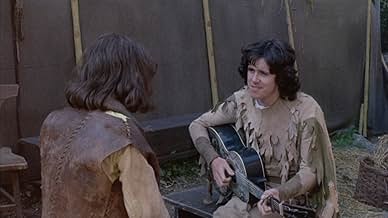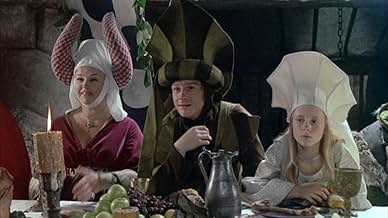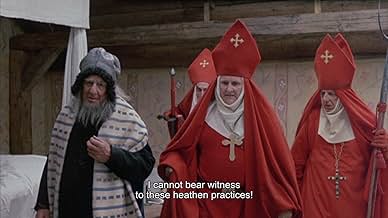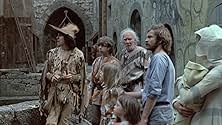IMDb RATING
6.3/10
1K
YOUR RATING
In 1349, while the Black Plague threatens Germany, a troupe of acrobats and musicians arrives in the town of Hamelin a few days before the mayor's daughter's wedding.In 1349, while the Black Plague threatens Germany, a troupe of acrobats and musicians arrives in the town of Hamelin a few days before the mayor's daughter's wedding.In 1349, while the Black Plague threatens Germany, a troupe of acrobats and musicians arrives in the town of Hamelin a few days before the mayor's daughter's wedding.
Featured reviews
The bubonic plague often began with the death of the rats before it spread to the people. This movie's version of the pied piper seems far closer to the origin of the story than anything else I've seen.
Grimm Brothers tale of a strolling minstrel in 1349 Germany who agrees to rid the village of Hamelin of plague-carrying rats is given a serious, perhaps overly-solemn treatment. Jacques Demy has directed the story in a straightforward fashion, without any humor or playfulness, mystery or beauty (with the exception of the sunrise-heightened finale). Pop singer Donovan is well-cast in the title role, and his music compositions are good even if his songs are not of the Medieval period. The other cast members--top-billed Jack Wild, Donald Pleasance and John Hurt--have very little to do; Wild, in particular, is forced to painfully hobble around with a crutch as an alchemist's assistant. Michael Hordern as Melius, who is unable to conjure a cure for the Black Death and is arrested for being a heretic, gives the picture's finest performance, though his final moment tied to a stake may prove to be too heavy for the movie's supposed 'family audience.' The dank, mildewy locations, period costumes and bedraggled extras all lend a convincing air to the film, but "Piper"'s downbeat nature (not to mention all those rats!) makes it a tough sell. ** from ****
Back when I was a (allegedly disturbed) young child, "The Pied Piper of Hamelin" was my absolute favorite fairy-tale. I owned many tapes that were filled with bedtime stories and fairy-tales, but I mostly just listened to "The Pied Piper" because it featured fascinatingly morbid topics like the black plague, child abduction, rat infestations and a mysteriously sinister guy playing the flute. I was always convinced the premise of Robert Browning's eerie poem could form the basis of a series of unimaginably dark horror movies, but unfortunately there aren't that many. This British production, filmed on location in Germany, is a pretty great version but it's incredibly obscure for some reason and I spent an awful long time purchasing a decent copy. Now that I finally own it, I'm both thrilled about re-experiencing the familiar story lines as well as surprised about discovering entirely new story aspects I wasn't even aware of. The new (to me, at least) elements mostly handle about political and religious hypocrisy, so I presume that is the reason why they weren't included in any of the fairy-tale versions I grew up with. But it remains a fascinating story and a fabulously engaging film, only suffering from obvious and regrettable budget restrictions. Director and co-writer Jacques Demy had a clear and personal vision of the story, and it's definitely not a movie for young children to watch. Although never graphic or repulsive, "The Pied Piper" thrives on a disturbing atmosphere and it never evades any controversial themes, like the abuse of political power by the Catholic Church and the arranged marriages with minors. Donovan is excellent as the Piper, passing through Hamelin with a family of traveling circus artists. The burgomaster and the Baron (another splendid role for versatile super-actor Donald Pleasance) supposedly run the secluded little town, but they mainly obey the will of the uncanny red monks that always look over their shoulders. The friendly Jewish alchemist Melius is concerned about a threatening outbreak of the Bubonic plague, the power-hungry son of the Baron (John Hurt) is about to wed the under-aged burgomaster's daughter for financial reasons and the Pied Piper is the only person capable of freeing the town from its rat infestation. The script of this film is well filled and requires your absolute full attention, but the elaboration of the different story lines is highly compelling and the dialogs are enchanting. The costume designs and scenery are terrific and genuinely take you back to the dark and unsettling medieval times. Donovan, primarily a singer, also provides the film with a couple of great songs (most notably "They Call me the Pied Piper" and "Life has its ups and downs") and there are at least two near-brilliant and unforgettable sequences. Namely the rats breaking out of the wedding cake and a harrowing execution scene near the end. If you own "The Pied Piper", it's definitely a film to treasure.
The original 303-line poem "The Pied Piper of Hamelin" was published by Robert Browning in 1842, and wow it's a doozy--thoroughly disturbing to the core and meant to be so. How we ended up with a cute bedtime fable is beyond me, but then again, in the original Sleeping Beauty, the Prince rapes her in her sleep. So.
Here in 1972, we get an excellent adaptation of the tale which retains much of the poem's disturbing nature but with a slightly softened tone, offering glimmers of goodness and hope despite the backdrop of 13th Century inhumanity, greed, religious murders and child marriages. Yea, did I mention this is not for kids?
What offsets the disturbing story is largely the wonderful performance and gentle voice of Donovan who plays the titular Piper. Whereas in the original poem the piper was sort of a mysterious opportunistic rogue, here we get a mysterious character who is more of a wise, savior figure. The songs he sings (written by Donovan) are not just beautiful to the ear, but the lyrics are tranquil and reassuring.
This contrasts brilliantly against the disturbing story which is about a small German village that is besieged not only by the plague but, even worse, besieged by a consortium of corrupt politicians, priests and landowners who would tax their own grandmother's false teeth. It gets even more disturbing as the plot revolves around a baron's shifty son who is preparing to wed an 11-year-old-girl so he can collect the dowry and fund his violent exploits, and all the while his father the baron is squeezing blood out of the villagers so he can build a cathedral in his own honor--much to the drooling approval of the local bishops. This is heavy stuff. This is not a children's fable. But it's a brilliantly done film.
Not only are the acting performances riveting, from Donald Pleasance as the tyrannical baron to John Hurt as his loathsome son to Michael Hordern as Melius the scholar who is the sole voice of reason, but the camera style is thoroughly engaging as it follows the action gracefully for long stretches without a cut. If you watch this film, notice how the camera moves through the scenery almost like a silent character in the film, and this draws us tighter into the drama in a voyeuristic way. The sets are enormous and authentic, and as I mentioned the music is first rate.
On a subtle note, the film also attempts to nudge history back toward the truth. In the original poem, as well as for centuries, it was commonly accepted and taught that rats were the cause of the Black Plague, but only in recent years have we learned that the plague was spread by people basically drinking water out of their own sewers (go figure). And in this adaptation, the rats are not shown to be the vile "vermin" which Robert Browning accused them of being, but instead they are shown to be more like symbolic warnings of what will befall man if man doesn't clean up his act.
There's a beautiful, sobering moment where the piper talks to a rat and says something like "I know you must treat each other much better than men treat each other" and that short scene summarizes the spirit of this film. Yes, it's disturbing, yes it shows the atrocities and cruelty that humans inflict upon each other, but there's a subtle undercurrent that tells us wisdom will eventually prevail. Will it? I dunno, nearly 50 years after the film's release we're still waiting.
Here in 1972, we get an excellent adaptation of the tale which retains much of the poem's disturbing nature but with a slightly softened tone, offering glimmers of goodness and hope despite the backdrop of 13th Century inhumanity, greed, religious murders and child marriages. Yea, did I mention this is not for kids?
What offsets the disturbing story is largely the wonderful performance and gentle voice of Donovan who plays the titular Piper. Whereas in the original poem the piper was sort of a mysterious opportunistic rogue, here we get a mysterious character who is more of a wise, savior figure. The songs he sings (written by Donovan) are not just beautiful to the ear, but the lyrics are tranquil and reassuring.
This contrasts brilliantly against the disturbing story which is about a small German village that is besieged not only by the plague but, even worse, besieged by a consortium of corrupt politicians, priests and landowners who would tax their own grandmother's false teeth. It gets even more disturbing as the plot revolves around a baron's shifty son who is preparing to wed an 11-year-old-girl so he can collect the dowry and fund his violent exploits, and all the while his father the baron is squeezing blood out of the villagers so he can build a cathedral in his own honor--much to the drooling approval of the local bishops. This is heavy stuff. This is not a children's fable. But it's a brilliantly done film.
Not only are the acting performances riveting, from Donald Pleasance as the tyrannical baron to John Hurt as his loathsome son to Michael Hordern as Melius the scholar who is the sole voice of reason, but the camera style is thoroughly engaging as it follows the action gracefully for long stretches without a cut. If you watch this film, notice how the camera moves through the scenery almost like a silent character in the film, and this draws us tighter into the drama in a voyeuristic way. The sets are enormous and authentic, and as I mentioned the music is first rate.
On a subtle note, the film also attempts to nudge history back toward the truth. In the original poem, as well as for centuries, it was commonly accepted and taught that rats were the cause of the Black Plague, but only in recent years have we learned that the plague was spread by people basically drinking water out of their own sewers (go figure). And in this adaptation, the rats are not shown to be the vile "vermin" which Robert Browning accused them of being, but instead they are shown to be more like symbolic warnings of what will befall man if man doesn't clean up his act.
There's a beautiful, sobering moment where the piper talks to a rat and says something like "I know you must treat each other much better than men treat each other" and that short scene summarizes the spirit of this film. Yes, it's disturbing, yes it shows the atrocities and cruelty that humans inflict upon each other, but there's a subtle undercurrent that tells us wisdom will eventually prevail. Will it? I dunno, nearly 50 years after the film's release we're still waiting.
Watching this recently, I remembered certain scenes from when I watched it as a child of about 7 or 8, some twenty-five years ago. That is testament to how effective some of The Pied Piper is. Indeed, in some ways it hardly qualifies as a "childrens' film" at all, as it starts with a picture of a heretic being burned at the stake and ends with the death of one of the main characters by the same means. Clearly Demy had Bergman's The Seventh Seal in mind for the general feel of the film, which stresses the irrationality and brutality of the times. However, the screenwriters and Demy add another ingredient - the political chicanery of the Church, the aristocracy and the merchant class, sometimes colluding together, at other times each promoting their own special interests. It's not difficult to read the film as a quasi-Marxist parable about feudal society, and the film-makers clearly intended something of the sort. If that makes it all sound very heavy, actually the film is fairly fast-moving and fun, especially because of the wonderfully comic grotesque playing of Donald Pleasance and Roy Kinnear. Fans of these actors should definitely seek this film out - Pleasance is as good as he was in "Death Line" (AKA "Raw Meat") made about the same time, and Kinnear is nearly as good as he was in "Juggernaut", another overlooked but very interesting British film of the early 70s. There is also a very good performance from Michael Hordern as the rationalist alchemist, one of his better and most substantial but unfortunately least known performances. Nostalgia fans can also take pleasure in remembering a time when Jack Wild, made famous by "Oliver", was considered a star. The Pied Piper deserves its mixed critical reputation. Demy does not here have the firm control over his material he had in earlier films. The main flaw is the total lack of characterisation of the Piper, and the terrible non-acting of the folk singer Donovan in that role. His musical interludes are just embarrassing and the worst thing about the film (for a similar ruining of a otherwise thoughtful historical film by a miscast singing star, see 1969's "Where's Jack?" with Tommy Steele). This is a pity as the socio-political stuff at the edges of the film, plus the costumes and scenery, are very good indeed. Overall, this is certainly worth a watch if it turns up on TV or you might, as I did, seek it out on a secondhand VHS cassette. It is not a major film but it's an endearing oddity, and certainly a must-see for Demy students or fans of Brtish film in the early 70s.
Did you know
- TriviaThe film was considered too dark for a children's film.
- ConnectionsFeatured in Jacquot de Nantes (1991)
- How long is The Pied Piper?Powered by Alexa
Details
- Release date
- Countries of origin
- Official site
- Languages
- Also known as
- The Pied Piper
- Filming locations
- Production companies
- See more company credits at IMDbPro
Contribute to this page
Suggest an edit or add missing content
































